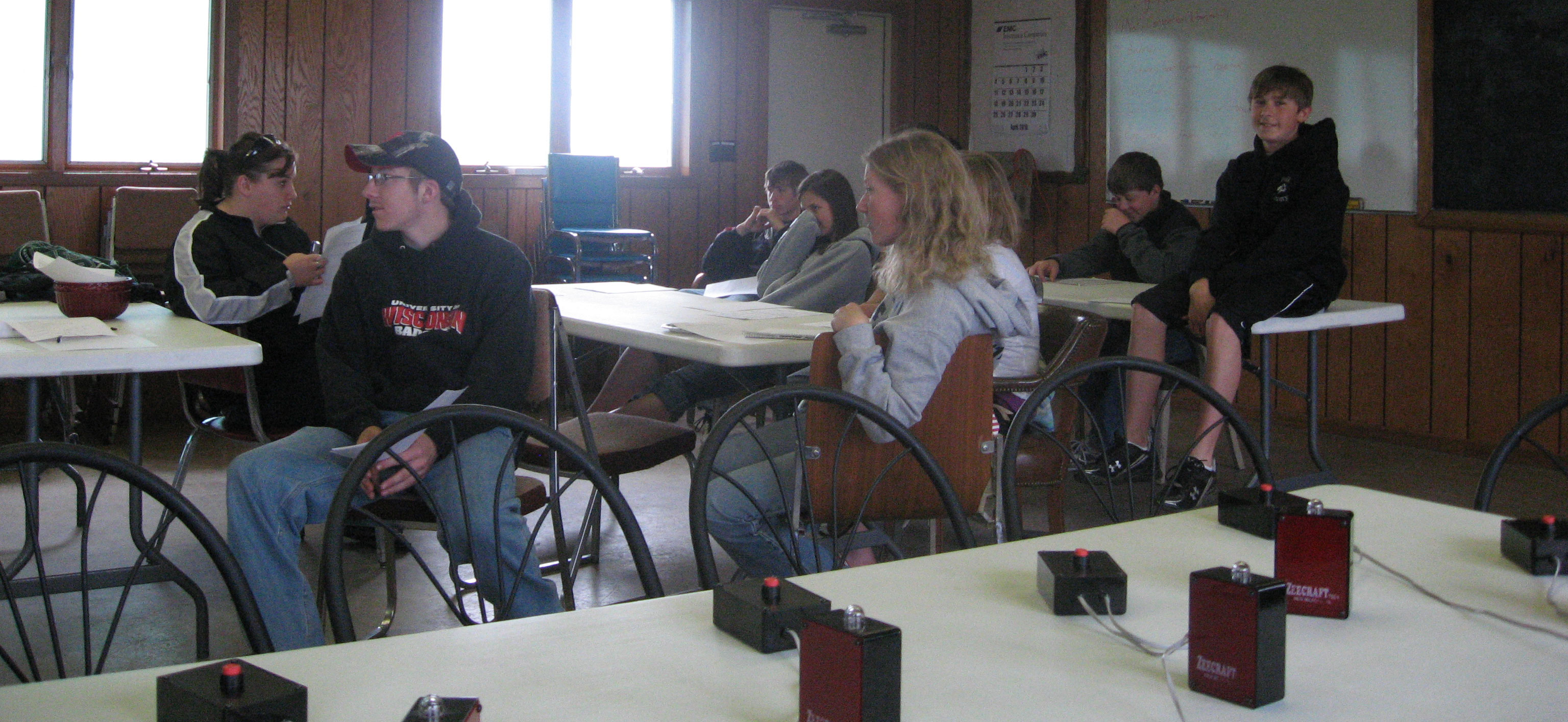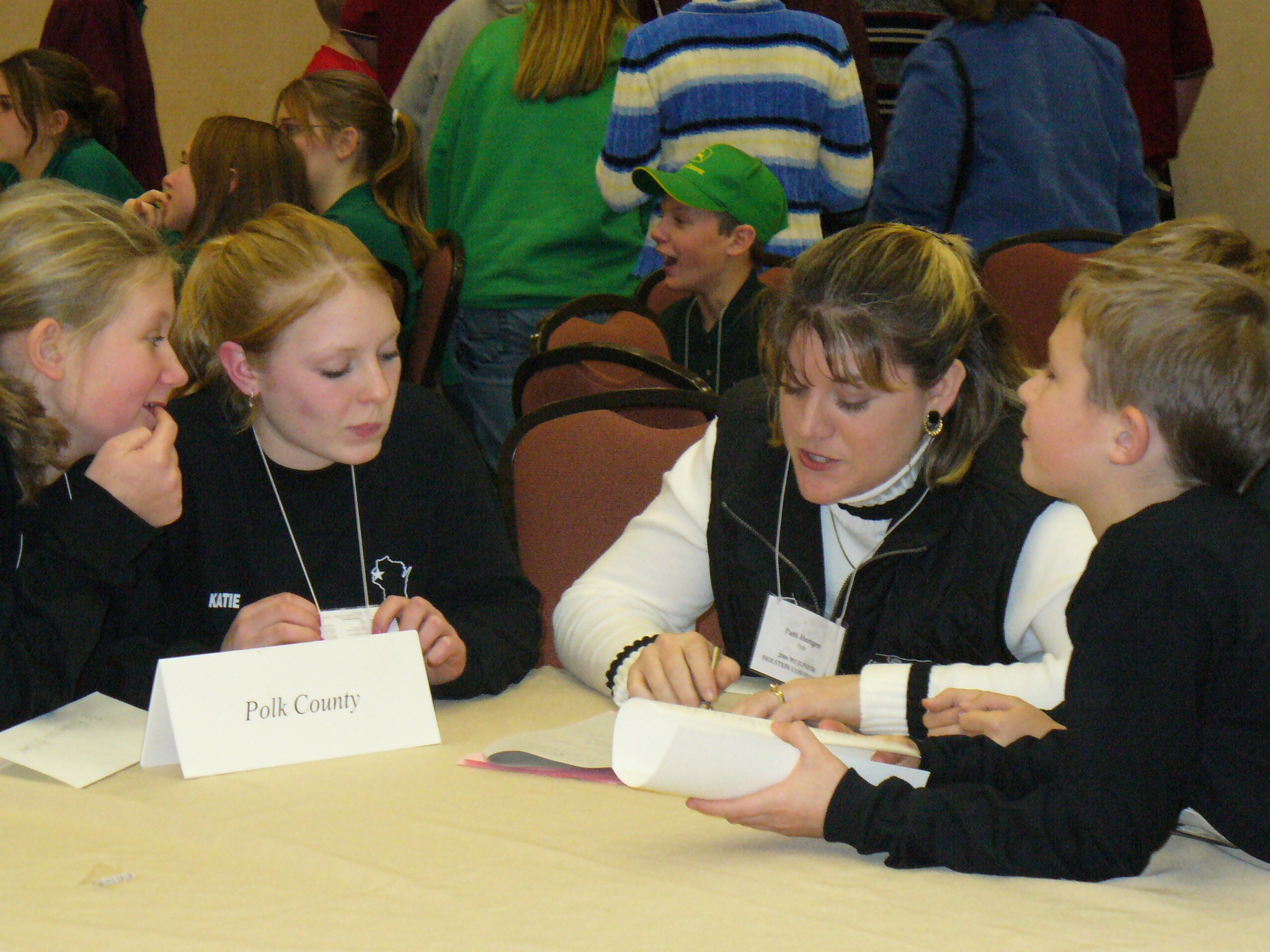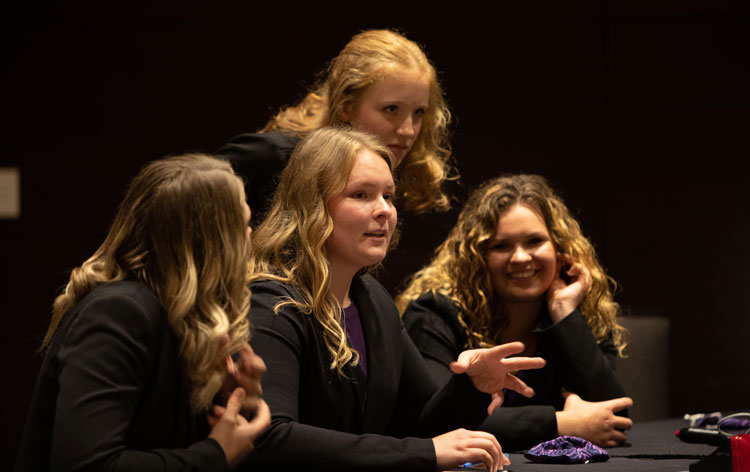I watched my first state dairy bowl contest in 1982 – just two years after the contest debuted on the national level. I was instantly engaged. I can still vividly picture the room and remember a few of the questions asked. Fast-forward a few decades and that solo spectator became a competitor, coach, and supporter of all things dairy bowl.
I always seem to have advice, but I only share it when it is requested. I did not feel I could give my opinions about coaching dairy bowl, until I could support my strategies. Last year, a team of young ladies that I coached for four years became the National Holstein Dairy Bowl contest champions. Three of the team members were also on the 2019 National 4-H Quiz Bowl champion team. The fourth person was high individual on the written test and was the captain of the 2018 reserve champion 4-H team. I had some very talented people to coach over the previous four years, but they had to still put forth the effort. They all first learned about dairy bowl as high schoolers and one as an 8th grader, which is older than many of my most competitive teams.
I have prepared my 12 tips for novice coaches and few that could apply to seasoned ones. Some of these tidbits may work for your teams, and others can be adapted to fit your team members’ personalities.
1. Set expectations early. Start with a meeting with the youth and their parents. Discuss when practices will be held, how often, and inform them that their attendance is expected at all practices. The date of the contest should be marked on all of their calendars. Study time is not just for a few hours with the team together; it is also practicing at home by themselves, with a parent, or with a sibling. Both are needed. If there is a volleyball tournament, wrestling competition, or dance recital on the contest day, then choices must be made at the beginning of the training season and not the week before the four-person team is scheduled to compete. They are a team and need to back each other up. A team needs to be at full-strength on competition day.

2. Know the rules. As a coach, read the rules and explain them to the youth. If they ask questions and you cannot answer them, find out. Do not wait until a rule against your team is enforced in a contest and your team did not understand it. Stalling with, “The answer is . . .” will get you a wrong answer and lose points in most contests, so don’t try to outsmart the system – you know it, or you don’t after 10 seconds. There are simple things, like waiting until the moderator says your name to speak (or you lose points), knowing what part of the contest allows team members to talk to each other (bonuses only), and understanding when you lose points for a wrong answer or when guessing will not cost you points. Do not frustrate your team with these distractions on contest day. Know the rules ahead of time and save a lot of tears and hard feelings.
3. Know the sources. Every contest has a different set of sources. That applies to different state contests, 4-H versus breed contest, and national contests. Questions can come from anything listed. That materials need to be read if you want to be fully prepared. If a question is used in a contest, I typically know where it came from because I have read the sources. If you just study the prepackaged questions, you will not learn this material and the context surrounding it. When I had more time, I highlighted the important items, typed notes on all chapters in each source, and wrote questions (including source page). That way, if at practice the members had questions, we could look it up and talk about it. Some answers may quote a different source than the one studied, so be prepared with where you learned the answer in case your answer is ruled incorrect by one source. As I advanced through the years, only the new sources get this thorough of a review.
4. Understand the procedure and strategy of how the contest is held. Some portions will have individual questions, and some will use buzzers to answer a question. Teams that have competed before know buzzer speed is important and they are ready. Novice teams may know the answer, but the question may not even be read in its entirety before the other team buzzes and gets it right. But be careful! Buzzing in too early can cost you the contest.
Having a balanced team where all members are able to correctly answer questions is ideal, rather than relying on one member to completely dominate. When three of the members correctly answer a question, they earn a bonus and it is a chance for only their team to answer a question and not lose points. The other team does not have the option to participate in your bonus. These are “free points” you can earn by being a balanced team, and they help to stretch a lead or close a gap. The team then works together to brainstorm in order to answer a multiple-part question.
There is a specific number of questions asked and a total amount of points available. If you have enough of a lead and the opponent cannot mathematically win if you do not buzz, then do not buzz! Your answer could be wrong, they could get it right, and your lead could be gone. This is amplified if the other team could earn a bonus with a third member correctly answering the question your team missed. That is a 40 point turn around on one question in most contests.
5. Teach forward and backward. When studying the basic question, teach youth to know the material – not just the answer. What vitamin deficiency causes rickets? The answer is vitamin D. But also ask, “Rickets is caused by a deficiency of which vitamin?” I am constantly amazed by the problems created by strict memorization of words and not of content.

6. Things do change. I have been around long enough to know that things change – even the things that were standards. Growing up there were 30 characters in an animal’s registration name. Any audience members who have not registered cattle in 35 years may not realize that number is now 27 for Holsteins. Businesses have become larger and LLCs are more commonplace in agriculture. Most adults were taught that LLC was limited liability corporation – however, that is now changed to limited liability company. And Holstein Association USA’s TPI formula was Total Performance Index, switched to Type Production Index, and then went back to Total Performance Index. And then there is DHI, which was a staple with nearly all dairy farmers. Dairy Herd Improvement is what it used to be, now it is Dairy Herd Information. That one will get an audience at a quiz bowl match riled up more than most questions, because it is a question that they think they know. How do you keep up? I will be the first to admit, it is tough, especially if you are not living and breathing it every day. The internet is a great tool, but it also can have outdated and incorrect material, so check the official sources and they will keep you current.
7. Be a storyteller. The best way to learn is to be relaxed and receptive to information. To help youth understand some concepts, I create word associations, which I hope will help them remember key information. An example would be about vitamin A deficiency. This would cause night blindless in cattle. I would make the statement that if you were low on vitamin A, you would need “A” new pair of glasses. Associating “vitamin A” and “A new pair” would tie vision back to the deficiency.

8. Repeat what you missed. When I ask a long series of study questions, I mark the ones that were missed. At the end of the session or day, we go over those again. And if they are missed again, they are asked at the next practice. Repetition helps reinforce the correct answer.
9. Keep it simple. I greatly dislike true/false and multiple-choice questions. It encourages guessing. I want to test their knowledge, not how well they can pick the best answer. If the youth start calling out possible answers, each one of those incorrect answers could stick in their head and surface at the inopportune time in a contest. Talk through why they gave their answer and then state the correct answer and repeat correct answers as you go through questions (not just ‘yes’ if they got it right).
10. Take field trips. When people, especially younger ones, can see the items being discussed, it helps to see or touch objects to “connect the dots.” It also aids in retention. A quote I remember is “once on the hand, forever on the mind.” When they can experience it, the knowledge will remain with them.
With my teams, we would take study breaks and head to the barn. We would learn the proper names of the milking equipment, hear the pulsator, and see the automatic takeoffs (ATO) in action. In the freestall barn, they were given a tape measure to determine if the stall length and width were within the recommended parameters. They would learn what a brisket board is and its purpose. When those items were not ideal, the concept of perching was discussed and why that decreases milk production. For those not raised on a farm, these are valuable lessons to enhance material studying. And for those on a farm, they often pick up a tidbit or two that their parents thought they knew, but really did not understand the reasoning behind certain decisions.
11. Call in reinforcements. Similar to taking field trips, there are talented individuals who can enhance the learning process. They may explain things differently and a new method might just click with a student struggling with a difficult concept. This could include the local nutritionist, breed classifier, or a veterinarian.
One of my previous team members loved his bovine reproductive classes in college. His internship involved reproductive research, and he was now responsible for those tasks in his full-time job. He was invited to a practice to talk about anatomy, hormones, and synchronization protocols. He was excited about the topic and shared that enthusiasm as he spoke to the team. He, too, injected humor and fun into studying. Years later, team members still talk about his facial expressions (wide eyes) and hand gestures (like an explosion) when he would say the word “ovulation” in response to the question about the term for the release of the egg.

12. Trust them and yourself. Going into a contest, I know that I have prepared them to the best of my ability. It is then up to them to showcase their knowledge. In some contests the team faces the audience and in others they face the judges. It does not matter to me. I do not look at them during the competition. I typically sit far from the team, with my head down, recording the score. It is how I manage the stress and thrill of competition. I know that they know the answer (95% of the time), so I expect them to answer if they know it or sit tight if they do not. Guessing is not a good strategy if you are behind because the hole typically gets bigger. Trust that the next question is something you know and build from there. They put the effort in and now as the coach, you can sit back and watch.
To others, it may not seem like a fun experience with all that studying and practice time, but for the contestants, they are excited and would not be doing it if it was not fun. I even had a practice contest with previous team members. Even though those older boys were out of dairy bowl for four years, they were excited, intense, bonus-happy, high-fiving the whole time. That shows me that they loved their time as quiz bowl competitors (and would probably still do it as adults).

We laugh a lot at practice, but on competition day, there is a focus. Outsiders do not see the behind-the-scenes effort they all put forth to prepare for championship day; they only see the stoic faces of a determined four-some. But, as their coach, you see the internal joy and want the same great experience for the next group of young people you coach.
Only one team will win, but they all will learn. Their study habits will transfer into their classes at school. I am often told that science and agriculture classes in high school and college are so much easier with their dairy bowl foundation. It’s an extra jolt of confidence for them as they continue on their educational journey.
Good luck preparing your teams!

The author is the online media manager and is responsible for the website, webinars, and social media. A graduate of Modesto Junior College and Fresno State, she was raised on a California dairy and frequently blogs on youth programs and consumer issues.